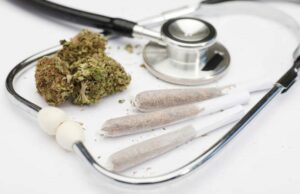This article is the 5th in a series that I am writing on the benefits of cannabis for pain relief. While researching and preparing for my Ted Talk several weeks ago, it is truly unique how valuable cannabis could be in replacing opioids for many patients’ pain therapy.
Now I have painted a pretty rosy picture of cannabis, and I am sure many people are asking about the downsides. Therefore, I want to go over some of the things people are worried about.
Let's start with death. As I mentioned, there are no, or very little, receptor sites on the pons for cannabis, so the overdose death problem isn't there. I want to think, as hard as the government pushed back against cannabis, that if there were any deaths to report, we would have seen the cannabis death tracker in the 80s like we saw the covid death counter in 2020.
We would all have a story about a kid in high school that smoked super scary cannabis and died that day from it. Those don't exist because cannabis just doesn't kill you.
Now, let's talk about addiction.
The CDC calls cannabis addiction a cannabis use disorder and an addiction. However, some articles state that up to 50% of people who use cannabis develop a cannabis use disorder or addiction. A cannabis use disorder is classified as someone who uses cannabis despite known negative consequences, like anger, violence, and seeking cannabis at all costs.
First, I know many people who have used cannabis in many of the forms available. From what I have seen, almost all of my friends, colleagues, and athletes use cannabis on and off every month. I have been using our strips every weekend and some weekdays for two years, and I never feel like I “need" it when I'm not on it.
Now the research on cannabis and mood is almost always positive. Most of it talks about being highly anxiolytic, which means removing anxiety, calmness, and relaxation is the major point of cannabis. Numerous studies show how it calms down the part of the brain that holds onto fear, hate, anger, and terror.
The research into how cannabinoids affect the brain shows a very different picture than what we are being told anecdotally. Let me ask you, does anger, violence, and seeking cannabis at all costs sound like 50% of the people you know that have used cannabis? That sounds like the exact opposite of what I have seen and felt. Evidently, old narratives from our government die hard.
What about the groggy issues the next day? Well, let's look at that. More and more people are using cannabis in whatever form they have to help them sleep. Would you take something if it made you groggy the next day? Why would people say cannabis helps me sleep if they wake up groggy and clouded the next day? Now if you stay up until 3 am smoking and get up at 6 for a job, then yes, you'll be groggy. However, that’s a lack of sleep issue, not a cannabis issue.

Since many other factors influence sleep, some people who use it to sleep may feel groggy the next day, but I have seen the exact opposite effect when used correctly.
From a clinical aspect, I have had more people report that melatonin makes them groggy than cannabis.
As we get closer to the release of my Ted Talk, I will keep posting information on all of my podcast, website and Substack channels. Please follow and ask questions at any time.
Check out Chalmers Pillarsofwellness.com for Wellness updates! And ask me any questions you have at questions@chalmerswellness.com. I answer all of them and look forward to hearing from you.
The Chalmers Wellness Stubstack just launched. Comment, Like, Interact with other people on their wellness journey. Communities can make the difference. DrChalmers.substack.com

Dr. Matt Chalmers
Disclaimer: This content is for informational purposes only. Before taking any action based on this information you should first consult with your physician or health care provider. This information is not intended to be a substitute for professional medical advice, diagnosis, or treatment. Always seek the advice of your physician or other qualified health providers with any questions regarding a medical condition, your health, or wellness.

